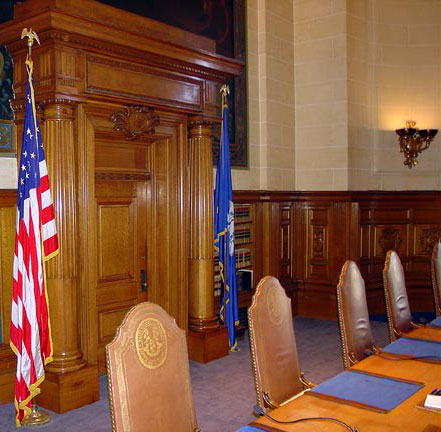Overview of the Supreme Court
Almost always, the cases heard in the
Supreme Court have
first been decided in the Superior Court, which is a trial court where a judge or a jury makes a
decision
based on conflicting stories from witnesses who describe the
history of the controversy. The losing party in the Superior Court has the
right to one appeal to another court. Most of these appeals go first to the
Appellate Court,
Connecticut's intermediate court of appeals.
controversy. The losing party in the Superior Court has the
right to one appeal to another court. Most of these appeals go first to the
Appellate Court,
Connecticut's intermediate court of appeals.
Appeals come to the Supreme
Court in one of two ways. A person who is dissatisfied with the judgment of
the Appellate Court can ask the Supreme Court to take another look at the
legal issues that are at stake, by filing a request that the appeal be
certified. Other appeals come to the Supreme Court as a result of a decision
to transfer the case to itself instead of having it be heard in the
Appellate Court, or as a result of a law mandating that an appeal must be
heard by the Supreme Court. For example, appeals involving reapportionment
of voting districts and death penalty cases are always heard in the Supreme
Court. After an appeal has been taken, each party files a brief and the
court then schedules the case for oral argument at the next available
session of the court.
If you listen to an oral argument at an
appellate-level court such as the Supreme Court, you will notice that it
differs from an oral argument in the trial court. In the trial court, the
lawyer is addressing a jury of lay persons or a judge, urging the jury or
judge to make certain findings of fact. In the Supreme Court, the lawyer is
addressing a panel of justices, urging them to reach certain conclusions of
law.
Before the oral argument, each justice has already carefully studied
the written briefs that present each party's legal arguments, as well as the
factual and procedural history of the case. The justices therefore ask many
questions in order to understand fully the positions being advanced by each
party. Although the justices sometimes ask about the facts, the dialogue
between the lawyers and the court centers on issues of law. The justices
expect the lawyers to know how the present case fits in with other cases
that the court has decided in the past and with statutes that the
legislature has adopted. The justices may also inquire into the possible
effect that a ruling in this case may have on related factual situations
that may arise in the future. Experienced lawyers welcome this dialogue as
the best way to win a close case. They know that oral argument may change
the justices' views of who should prevail on appeal or of why a particular
party should prevail.
Top